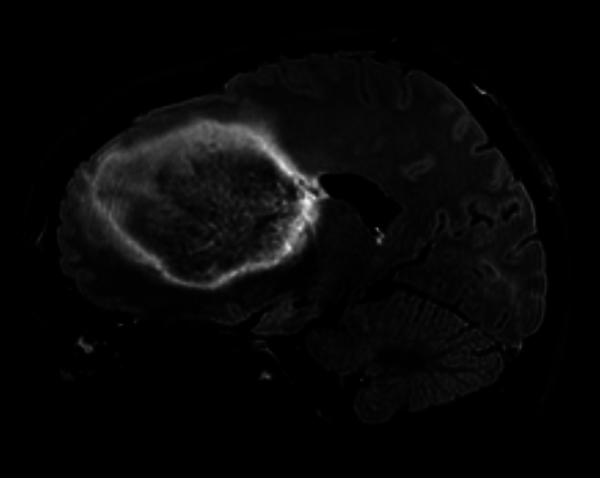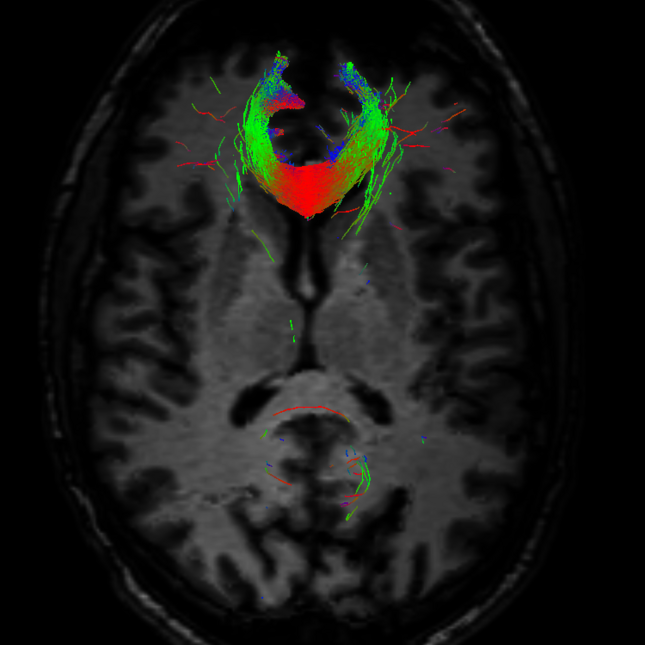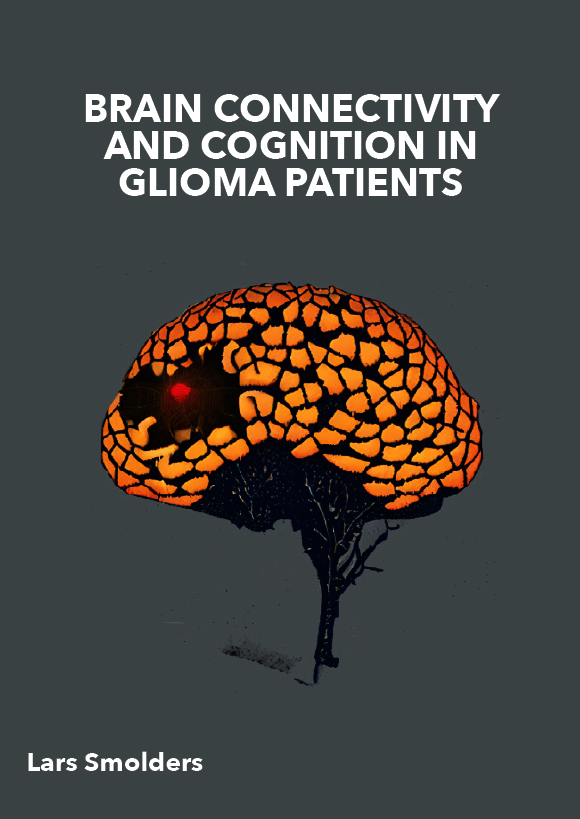Patients with a glioma, a type of malignant brain tumor, can suffer from cognitive problems after surgery. However, the true effect of surgery on complex cognitive tasks is not known. To predict the effects of surgery on cognitive tasks, PhD researcher Lars Smolders developed an AI model that utilizes information about neural connections in the brain extracted from the patient's MRI images before surgery.
The removal of a malignant brain tumor or glioma can extend a patient's life by many years depending on the type of glioma. However, it can also mark the start of another difficult health journey.
"Many patients suffer from cognitive problems, such as trouble with concentration and performing complex tasks, after their brain tumor has been removed," says Lars Smolders, PhD researcher in the Department of Mathematics and Computer Science who defended his PhD thesis on January 7.

Difficult to predict
"These issues lead to major problems in the daily lives of treated patients, severely reducing their quality of life," Smolders notes.
"While neurological problems such as partial paralysis and loss of vision are well understood, the effect of surgery on more complex cognitive functions is not well known, and it is difficult to predict beforehand how individual patients are affected by surgery."
Cognitive issues lead to major problems in the daily lives of treated patients.
PhD Lars Smolders
AI model
To help predict how a patient with a malignant brain tumor performs cognitive tasks after surgery, Smolders and his collaborators developed an AI model.
The brain depends critically on neurons forming long-distance bundles of so-called white matter that physically interconnect regions of the brain.

MRI before surgery
"As input data for the model, we isolated key structural details from large so-called white-matter connections in the brain that are visible in MRI images of the brain taken before surgery," says Smolders. "We used these to examine how resistant each patient's brain is to damage caused by treatment to remove or eliminate the tumor."
Previously, predicting cognitive outcomes after treatment was almost impossible, even though these outcomes are very important for a patient's daily life.
The information produced by Smolders' model could be used by surgeons in the future to assess a patient's suitability for surgery, potentially sparing vulnerable patients from irreversible neurological disabilities. However, the approach needs to be clinically validated on a large patient group first.
Road to the AI model
The road to the AI model was an interesting one to say the least, as Smolders highlights. "The location of brain damage is often used to predict the type of neurological problems patients will suffer from, but we found that the location of a brain tumor barely helps with predicting these problems in patients."
Consequently, the researcher had to develop new methods. "This made me realize that the function of the brain is even more complicated than I first thought, and that a lot of work would be required to achieve the desired goal of reliably predicting outcomes after surgery for individual patients."
Eventually, Smolders managed to develop a predictive model that reasonably predicts whether a patient will suffer from cognitive problems after treatment.
This made me realize that the function of the brain is even more complicated than I first thought.
PhD Lars Smolders
"This model is based on properties of white matter connections in patient's brains before surgery. To me, it is fascinating that we can develop a measure of a brain's vulnerability to damage (inflicted by surgery and/or chemo- and radiotherapy) based only on MRI images."

Old methods don't work
During his PhD research, Smolders followed a path that combined mathematics, algorithms, neuroscience, and AI. However, at the very start of the project, he and his collaborators noted something puzzling and worrying.
"At the start of the research, we applied several established methods from the network neuroscience literature to study patients with a brain tumor to predict what might cause cognitive problems in these patients. But for the patient group in this study, these methods just didn't work."
For example, many established algorithms explored by Smolders to study MRI images of the brain fail when analyzing brains with large deformations, which often occur in the presence of tumors.
Debunking faulty conclusions
"We also found that existing literature dedicated to studying healthy brains drew faulty conclusions about the link between the structure and function of the brain. So, we wrote a commentary paper on this subject to debunk some of the faulty conclusions made by researchers in the past," says Smolders.
Self-discovery
Given that Smolders has been travelling on a trajectory in technical topics for much of his career, you would assume that he has an implicit affinity with these topics. Well, during his PhD exploits, Smolders learned something new about himself.
"I discovered that I like doing science more than I expected. In the mathematics and computer science master's at TU/e, you are educated more like an engineer than a scientist. By collaborating with neuropsychologists and neurosurgeons for my PhD, I learned more about conducting fundamental scientific research and greatly enjoyed combining my skills to develop new mathematical methods with neuroscientific research."
I discovered that I like doing science more than I expected!
PhD Lars Smolders
In addition, Smolders' view of the brain changed over the course of his project. "The brain is a complex system that produces complex behavior, which should eventually be explainable through mathematical models. During the project I found that there is a lot left to learn about the structure and functioning of the brain, and brain tumor patients give us a unique lens through which to view the brain."

Contributing to future healthcare
In the future, Smolders and his colleagues would like to integrate the activity of the individual patient brain into their predictive model to improve model accuracy.
A more accurate model could significantly reduce the risks of neurological impairments after surgery and improve the lives of brain tumor patients after treatment.
Smolders hopes to carry out this work as a postdoctoral researcher, and he's co-written a proposal as he seeks funding for the position.
"If the funding application is successful, it would continue the existing collaboration between TU/e and the neurosurgery department of the Elisabeth-Tweesteden hospital in Tilburg, from which we have learned a lot and which I expect will lead to meaningful breakthroughs for the future of healthcare. And I want to be there for those breakthroughs too!"
Title of PhD thesis: Brain connectivity and cognition in glioma patients . Supervisors: Luc Florack, Remco van der Hofstad, and Wouter De Baene (external).






